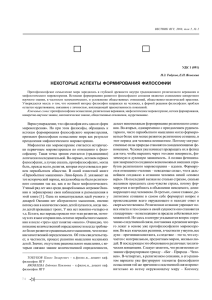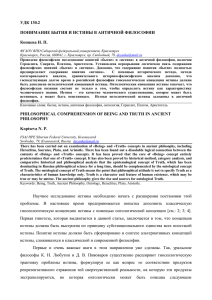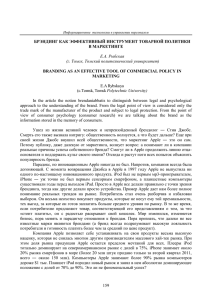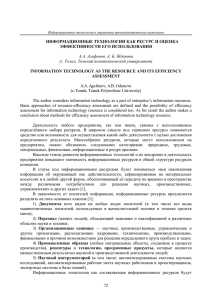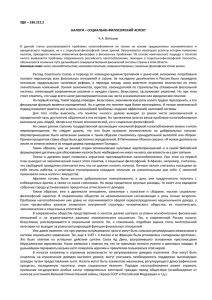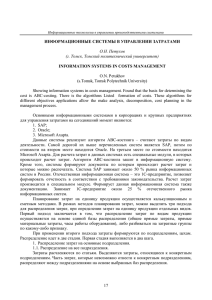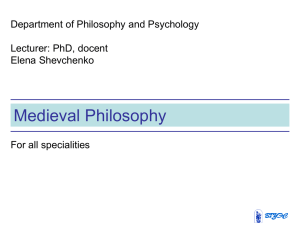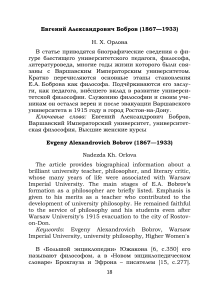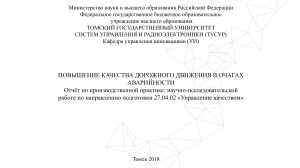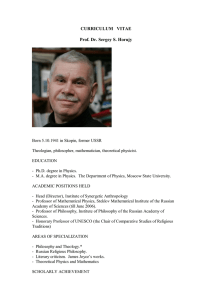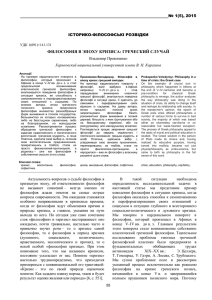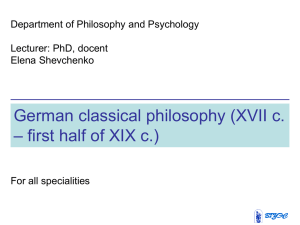ИСАЙЯ БЕРЛИН И ПРОБЛЕМЫ ОПРЕДЕЛЕНИЯ ПОНЯТИЯ
реклама
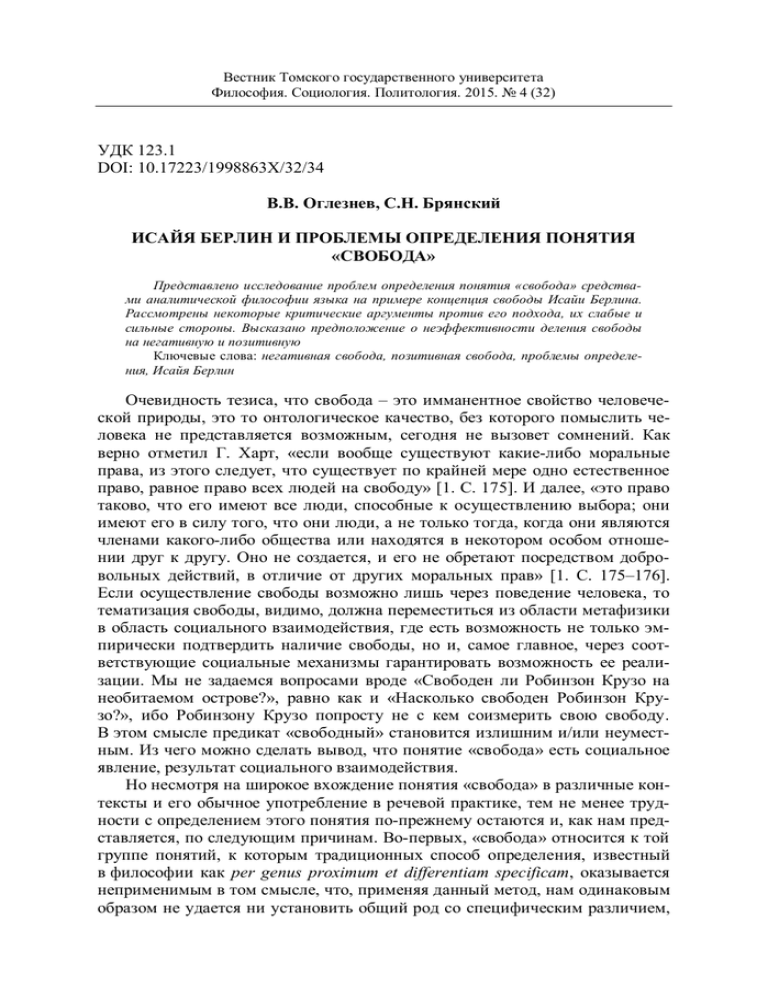
. . . 2015. 4 (32) 123.1 DOI: 10.17223/1998863 /32/34 . , . » « » . , . : , , - , , – , - , , . . , « , , , » [1. . 175]. , ,« , ; , , . , . 175–176]. , , , » [1. , , , , . , - , « ?», « . - ?», « . » , « , » . « » - , , , . ,« » , , per genus proximum et differentiam specificam, , , , , « » « » proximum et differentiam specificam , , « « » de res, terminus [2. . 231–233]. , , « », «liberty» «freedom», , . -liberty [3–5]. , ( » - -freedom, , . », « , « , (« . per genus , de , liberte, Freiheit), , , . 319 » « , » [6]. »), « « », , » , , XX . » («definition in use»). , , , . - « , « , - » , . « » , , , , . - . , « » , , – , . , , - . [7] , . , ? ? , . , . , , , , , , - , , , . 320 , . . . , , - , . , , , « . » , - , », , . , , . , , , , - , , . . - , . , . . , - , . , - . . : , - , . . ( . , , ), ( , - , , , ). « , , « :“ , - », , , , . « ?” », , ?” » [6. . 126]. , :“ , , , , . , . . , ? , ? - , , . , , , . . « – – , « 321 , » . » « » « , , « - » [8. C. 312]. » - , , . « , , » , . , - , , . , , , : » . , , , . : , , , - . , . . : , ) «X ) Z», X », , Z– , ( –« , , Y ( ,Y , - , . , , « - , , » [8. C. 314]. , , , - , . , , - , . , , , . , , . , - , , , . , , , , , ., , - , , . - , . - . 322 , . ? , , - , , . . , 500 . , , , – - , , , , , , , , - . , – ( ), « » . - . » « , , , - . . , , «X ( « , - Y ) Z» , , ( ) , X Z, ». . X Y , « Z, , . X , « - , », Y. , . ,« , , , (1) , , (2) - ( ) , , , » [1. . 175]. , « ». - , . , , , « , , , , . , , , - , « , , » « »– - « » 323 . ; , . , , « »–“ … ”– , “ » [8. C. 318]. , , ”, , . , - . . :« , , , , , , » - , . [9. . 157]. , , , - , . , « » [10. . 511]. , , . , . , , - . , [11]. , ( ), . - , . - , . « , - » , . - , . . , ,« , - , , » [12. . 111]. , « , » - . 1. Hart H.L.A. Are There Any Natural Rights? // The Philosophical Review. 1955. Vol. 64, No. 2. P. 175–191. . 324 2. ., . // Scholae. , . per genus proximum et differentiam specificam . 2015. 2 (9). . 228–240. 3. Gibbs B. Freedom and Liberation. London: Chatto and Windus, 1976. 4. Flathman R. The Philosophy and Politics of Freedom. Chicago University Press, 1987. 5. . . ., 2005. 6. . . . .: , 2001. 7. . « » // . . . . . . 2010. 3 (11). . 61–67. 8. MacCallum G.C. Negative and Positive Freedom // The Philosophical Review. 1967. Vol. 76, No. 3. P. 312–334. 9. . : // . 2013. 2 (92). . 155–186. 10. Gray J. On Negative and Positive Liberty // Political Studies. 1980. Vol. 28. P. 507–26. 11. Taylor C. “What’s Wrong with Negative Liberty”, in A. Ryan (ed.), The Idea of Freedom. Oxford University Press, 1979. 12. Svendsen L. A Philosophy of Freedom. London: Reaktion Books, 2014. Ogleznev Vitaly V. National Research Tomsk State University; Russian State University of Justice (Tomsk, Russian Federation) DOI: 10.17223/1998863 /32/34 BRYANSKIY Sergey N. National Research Tomsk State University (Tomsk, Russian Federation) DOI: 10.17223/1998863 /32/34 ISAIAH BERLIN AND PROBLEMS WITH THE DEFINITION OF FREEDOM Keywords: negative freedom, positive freedom, problems of definition, ordinary language, context, Isaiah Berlin. The article deals with a study of the problems with the definition of freedom by the means the analytic philosophy of language on an example of Isaiah Berlin’s concept of freedom of. Certain critical arguments against his approach, their strengths and weaknesses, are represented. As it is known, the idea of distinguishing between a negative and a positive sense of the term «freedom» goes back at least to Kant, and was examined and defended in depth by Isaiah Berlin in the 1950s and ’60s. Discussions about positive and negative freedom normally take place within the context of political and social philosophy. They are distinct from, though sometimes related to, philosophical discussions about free will. Work on the nature of positive liberty often overlaps, however, with work on the nature of autonomy. As Berlin showed, negative and positive freedom are not merely two distinct kinds of freedom; they can be seen as rival, incompatible interpretations of a single political ideal. Since few people claim to be against liberty, the way this term is interpreted and defined can have important philosophical implications. It has also suggested that the idea of distinguishing between a negative and a positive sense of the term of freedom is for the several reasons ineffective. References 1. Hart, H.L.A. (1955) Are There Any Natural Rights? The Philosophical Review. 64(2). pp. 175–191. 2. Ogleznev, V.V. & Surovtsev, V.A. (2015) Definition per genus proximum et differentiam specificam and legal language. Scholae. Filosofskoe antikovedenie i klassicheskaya traditsiya – Ancient Philosophy and the Classical Tradition. 2(9). pp. 228–240. (In Russian). 3. Gibbs, B. (1976) Freedom and Liberation. London: Chatto and Windus. 4. Flathman, R. (1987) The Philosophy and Politics of Freedom. Chicago: Chicago University Press. 5. Aron, R. (2005) Esse o svobodakh [An essays on freedoms]. Moscow: Praksis. 6. Berlin, I. (2001) Filosofiya svobody. Evropa [Philosophy of Freedom. Europe]. Moscow: Novoe literaturnoe obozrenie. 7. Ogleznev, V.V. (2010) Interpretatsiya ponyatiya “svoboda” v analiticheskoy politicheskoy filosofii [The interpretation of the concept of “freedom” in the analytical political philosophy]. Vest- « » 325 nik Tomskogo gosudarstvennogo universiteta. Filosofiya. Sotsiologiya. Politologiya – Tomsk State University Journal of Philosophy, Sociology and Political Science. 3(11). pp. 61–67. 8. MacCallum, G.C. (1967) Negative and Positive Freedom. The Philosophical Review. 76(3). pp. 312-334. DOI: 10.2307/2183622 9. Skinner, K. (2013) Ideya negativnoy svobody: filosofskie i istoricheskie perspektivy [The idea of negative liberty: The philosophical and historical perspectives]. Logos. 2(92). pp. 155–186. 10. Gray, J. (1980) On Negative and Positive Liberty. Political Studies. 28. pp. 507–26. DOI: 10.1111/j.1467-9248.1980.tb01256.x 11. Taylor, C. (1979) What’s Wrong with Negative Liberty. In: Ryan, A. (ed.) The Idea of Freedom. Oxford University Press. 12. Svendsen, L. (2014) A Philosophy of Freedom. London: Reaktion Books.
